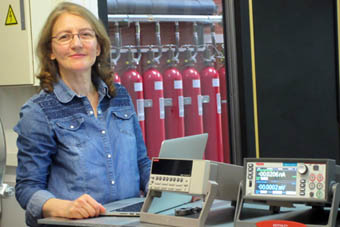
A project by IFIC-CSIC-UV), funded by UNESCO’s Chair of the Universitat de València, expects the training in the IFIC of two PhD students coming from the University of Sciences and Technology Houari Boumediene (USTHB) in Algiers. The projects created by these students develop a new system to measure the amount of radioactive dosage presented in cancer therapy. They also study the activity of radioactive elements on Algerian soil.
The project, encouraged by IFIC’s researcher Nadia Yahlali, will be the first of its kind in the field of scientific and technical co-operation, funded by the Development Studies UNESCO’s Chair of the UV. Moreover, it counts on the support of the Cooperation Area in the General Foundation of the UV, of the IFIC, and of the Department of Atomic Molecular and Nuclear Physics and its Environmental Radioactivity Laboratory.
The project satisfies the UNESCO’s Chair of the UV’s aims of establishing university exchange programmes and aid for the training of specialists, as well as the Sustainable Development Goals’ aims of encouraging a partnership for development and ensuring environmental sustainability. Along this year, IFIC -pioneer in the experimental study of constituents of matter in Spain- will welcome the two PhD students from USTHB involved in the project.
“The objective is to offer experimental training in dosimetry and radioactivity measurement”, explains Nadia Yahlali, IFIC researcher who supports the project. “Experimental training, a field in which IFIC is highly experienced, should be encouraged in Algiers”, states.
In the field of medical physics, Yahlali proposed to the Argelian University to carry out a study in order to develop a small dosimeter capable of introducing itself in the human body and measuring in real time the radiation received in cancer therapy such as brachytherapy. According to Yahlali, there has been notable development in the training of diagnostic techniques via medical imaging (CAT, PET, etc.) in USTHB. It has been caused by the specialists´ need to use these devices in hospitals; but research on the development of new technologies is scarce.
Thus, PhD Student involved in this research will take advantage of IFIC’s experience in the development of detectors for the basic research on elementary particles carried out in experiments such as NEXT, ANTARES and ATLAS constructed at the Large Hadron Collider (LHC) at CERN, and for the medical physics. “The idea is that students could transfer their knowledge acquired here to their university”, researcher of Argelian origin who has developed her scientific career in Experimental Nuclear and Particle Physics in IFIC, and who also collaborates now in the NEXT experiment.
In environmental radioactivity, the project will allow enable analysis through gamma spectrometry ground samples obtained in Algeria by means of a big germanium detector from the Environmental Radioactivity Laboratory. This device enables the measurement of radioactivity in lower energies, widening the radionuclides spectrum of interest for the study. In Valencia in particular, the excess of a lead isotope (Pb-210) that is used to make the land sedimentation chronology in scales of less than 100 years, could be measured.
This way, the activity of radionuclides that have their origin in human activities such as caesium-137, strontium-90 or plutonium (coming from French nuclear tests carried out in the 50s and 60s or even from the Chernobyl accident); and others of natural origin such as beryllium-7 and the abovementioned lead-210 (which origin is in the cosmic radiations or certain Earth materials) could be measured.
The measurement of these radioactivity elements in lands with risk of erosion will allow scientists to date the sediments and to measure the soil loss. Associated to other sources like GPS, this information will allow the making of geonuclear maps which show the recent changes in soils and which can anticipate their evolution. Therefore, these studies will contribute to quantifying and observing the erosion processes of Algerian soils and to anticipating problems such as desertification, in addition to evaluating the impact of this environmental radioactivity on the population.
The project ‘Cooperation for the Research on Medical Physics and Environmental Radioactivity’ is the first one in the scientific-technological field that will be funded by the UNESCO Chair of the Universitat de València, founded in 1994. It also has the economic support of the IFIC through the programme Severo Ochoa as a Centre of Excellence. Moreover, it is the first action that is part of a wider collaboration agreement that the Universitat de València and the University of Sciences and Technology Houari Boumediene (USTHB) of Algeria are finalising, promoted by the coordinator of the project.
More information:
Cooperation Area of the General Foundation of the Universitat de València
https://es.unesco.org/world-education-forum-2015/about-forum/declaracion-de-incheon
Last update: 31 de may de 2016 08:22.
News release


















